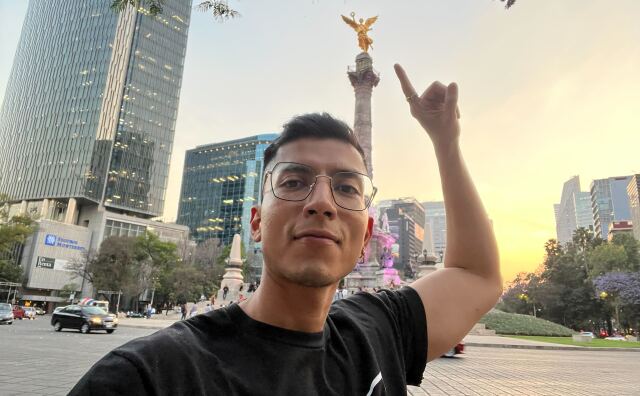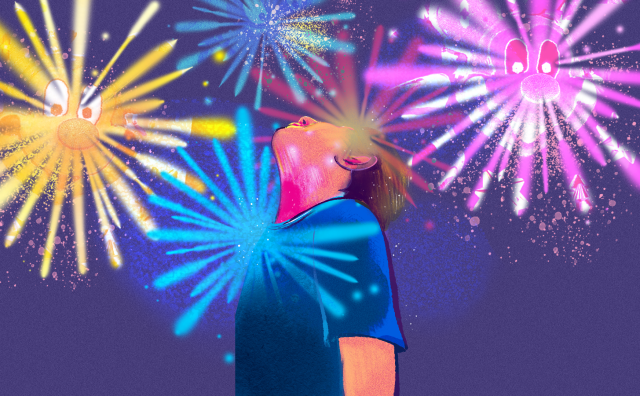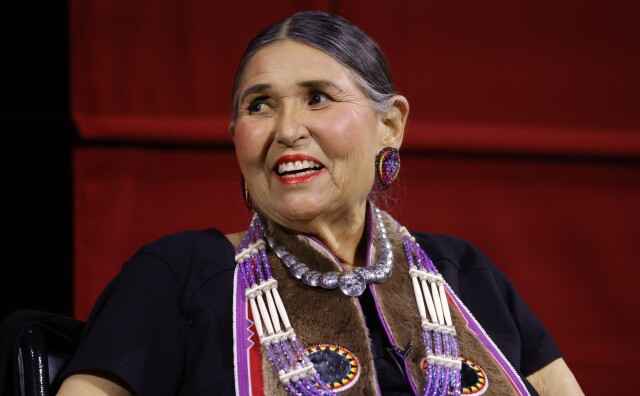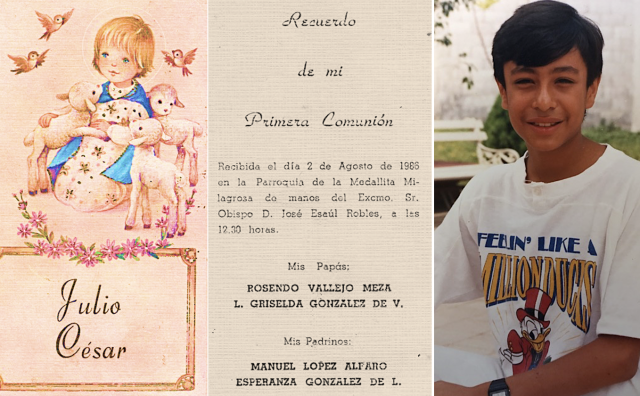'I Thought I Would Be Safer Here': Trying To Find Shelter From Anti-Asian Hate

In the summer of last year, I packed up my things and moved across town to a quaint apartment with high ceilings and an abundance of light.
-
From June 2020 to July 2021, we published your stories each week to continue important conversations about race/ethnicity, identity and how both affect our lived experiences. We now have a new series Being American, which is again soliciting your essays.
-
Read:
After years of being house rich but cash poor, having spent my life savings on a condo I struggled to afford, I sold my home in Van Nuys to start fresh. Mid-pandemic might not have been the best time to move, but it felt like the right decision for where I was in my life.
It wasn't that hard to decide where to move. I missed the Asian flavors I grew up with, and I wanted to have more grocery stores to choose from than the single 99 Ranch Market on Sepulveda. The way I saw it, the San Gabriel Valley was too far, and the Westside was too expensive, so I landed on Koreatown. The local H Mart has a lot of ingredients for Chinese cooking, I figured, and I love Korean food in its own right!
There was another reason I chose Koreatown, though, which I told very few people at the time: I thought I would be safer here.
Last year opened my eyes to the ways that racism is threaded into our collective experiences of space. It isn't as though I wasn't aware of it to some degree in the past, but I didn't understand how subtle it could be, and how some of the most endemic parts of racism were the hardest to see and fight.

I started experiencing more overt racism in my old community after Trump was elected in 2016, like having "Go home, chinky!" shouted at me by angry men in trucks in nearby Sherman Oaks. Then last year, like many people, I felt the tension increase thanks to rhetoric like "Kung-flu" and blaming Chinese people for causing the coronavirus by eating bats.
On a couple of occasions, I overheard conversations about conspiracies like how the virus was coming in on shipping containers from China, not American travelers abroad. The sentiment was that they needed to avoid things from China. There were a few Trump 2020 signs in the windows around my old neighborhood, and this made me feel uneasy and worried about potential bad interactions. From what I saw in the media, I got the impression that Trump supporters were often the ones spreading this hateful rhetoric.
It felt like the anti-Asian sentiment was growing, and I didn't want to be cornered by racism. So when it came time to decide where I wanted to call my new home, I wanted to be near other Asian people -- safety in numbers, I thought.
'I ACCEPTED THIS AS NORMAL'
In this past year, as anti-Asian hate has escalated, I've also begun to own the part I played in fueling the system.
One piece of my complicity is in accepting the objectification of Asian women, and thinking that the "good" racial stereotypes were worth holding onto, because it seemed better than just experiencing hate. These are things I'm only now finding words for.
In many ways, I was just playing along because I was taught that this is how you survive in a hostile world. The subconscious thought was, If I accept this reality, it will cause me less pain. But that's not true.
I'm an immigrant, born in China, and raised in Canada since the age of 3. I have an English name, given to me by my parents when I started school and, eventually, I associated more with my English name than the one I was born with.

My name is a form of armor, and the first way that I assimilated into this new culture. It has protected me and offered the privilege of entry to spaces I may have felt less welcome in without it.
There is a kind of relief I see on some faces when I say, "You can call me Amy." I long accepted this as normal.
The reality is that assimilation happens gradually, and it's not just a way that immigrants like me try to fit into a new country. We are all asked to assimilate to the dominant beliefs and customs of an environment.
For example, as a girl, I was taught that women need to work twice as hard as men to be successful, and at the same time, that we should ultimately submit to their needs first. No one said this explicitly. It was learned through experience and consequence -- or lack of consequence, as it pertained to the way I was treated by men and boys.
I have more painful memories around this than I know how to share, and I'm not alone in this trauma. As an Asian woman, I also do not know how to disentangle my experience of race and gender.
I remember one early taste of harassment at the age of 12, by a sleazy group of businessmen in Shanghai, where my family was vacationing. They wanted me to take a picture with them. "Come on, it's just a picture," they cajoled, "we think you're pretty, just come over here. It'll be quick." Strange hands on my hips. Strange hands on my shoulders.

That's what you get when you're a pretty girl, a family member later told me. I internalized that.
There was the college party in L.A., after I moved here, where one guy spent the whole night trying to get me to sit in his lap. Eventually, I gave in. It's just a laugh, right? He thinks I'm pretty and just wants to get a picture with me. Oh, and the guy who told me, "I like dating Asian girls, but I know I'll end up marrying a white one." Sure, he thinks we're attractive, but naturally, he'll want to marry someone with a relatable cultural background. This is all normal, right? I repeated this to myself so many times, I grew numb to it.
It's impossible to parse the motivations of my aggressors. All I know is that I built a twisted kind of protection around my heart to survive the aftermath. If I believe this is normal, it's going to be okay.
I'm writing this shortly after six Asian women were murdered in Atlanta by a white man who called himself a sex addict, reportedly patronized the spas where they worked, then shot them and others there to eliminate his "temptation." He objectified them and used that as an excuse for his violence.

My friends are posting on social media about how Asian women need to be aware of their surroundings and be careful when they move through public spaces. But I've been living this way for years, constantly aware of dark corners, assessing strangers' body language, assessing threats, and even learning self-defense. I built this vigilance because I wanted to feel safe. I did this after moving to L.A.
WHERE IS SAFE?
I moved to L.A for college. I was more than excited to ditch the six-month winters of Canada for palm trees and the kind of December where you can wear a skirt with boots. About a month into this new life, I found myself cornered by two big men in an alley, who demanded my purse.
They were probably disappointed to only find five bucks in my wallet, but it taught me my first concrete lesson in situational awareness. If two random men are waving you over, they're not asking for the time, your help, or friendly conversation -- even in daylight.
There is a thought I often had in those early days: Is there something about me that makes people think I'm an easy target? Do I have it written on my face? In a way, the answer is yes. I'm a woman and I'm Asian.
MORE FROM OUR RACE IN LA SERIES
- Zola's Story: 'What Am I?' I'm Just A Pretty Little Girl
- Don't Turn My Community Into COVID-19 'Trauma Porn'
- A Latino 'Gringo' On Straddling Two Cultures, Never Enough Of Either
- Life Beneath Hollywood's 'Bamboo Ceiling'
- Boricua At Home, Black In The World: An Afro Latina in LA
- As A Black Nurse At The Pandemic's Frontlines, I've Had A Close Look At America's Racial Divisions
- 'What Are You?' 'Are You Adopted?' A Biracial Black Woman Gets Real About The Questions People Have The Nerve To Ask
- Reading While Black, And Other Ways To Court Trouble
- Reparations And Reinvestment: Contemplating The Proverbial '40 Acres And A Mule' Today
- Claiming My Dignity On A San Fernando Valley Street
- The Day My Brother Learned To Fly
- In The Process Of Becoming American: A Proud Son Of Immigrants Reflects On His Family's Past And Future
- How To Participate In Our Series
At this point, I've lived in neighborhoods all across the city, from a comfy apartment in a sleepy area in Palms to an affordable space in Echo Park, at a time when gunshots at night were common. I remember going for a morning run one day to find the park sign riddled with bullet holes. I'm not sure what happened the night before, but the sight of it was a shock to a girl from a place where guns were for deer hunters.
Over time these things shocked me less as I became more guarded, and the everyday violence was woven into my definition of normal.

When I moved to the Valley, I hoped it would be quieter than in some of the other neighborhoods I'd lived in. In many ways, it was. I made some good friends, and had some fantastic neighbors that I still keep in touch with. I definitely didn't find bullet holes on park signs.
But I began feeling unsafe nonetheless. When I sold my condo, the decision to move away wasn't just about feeling elevated racial tensions, but a lifetime of conditioning that's taught me to run when I feel there might be danger.
I've come to since understand that I'm no safer in Koreatown than I was in Van Nuys. My instinct to find and be closer to people who look like me will not protect me from the damages of racism or sexism.

Since moving here, I've experienced a few more incidents of hateful remarks being shouted at me or muttered as I pass by.
There was a casual slur tossed at me by a stranger as I walked my dog. One morning, a woman shouted "F*** you!" at me from her window, then quickly closed the blinds. Then there was the horror of learning a young Korean American man was assaulted and beaten a few blocks from my home.
I now understand that vigilance and self-defense are woefully limited, and that I can't keep running away. To be truly safe someday, we have to fight for greater equality for everyone. I want to live in a world where men stop objectifying women, so we can break the cycle of violence and misogyny. I want to live in a world where racism is dismantled in our hearts and our systems of governance. That would be a world where people love and respect each other for their diversity.
It doesn't matter where I move. This is reality: I'm not going to be safe from hate until we all are.
-
Yiming Amy Hua was born in China and grew up in the foothills of the Canadian Rocky Mountains. She has lived in Los Angeles for 15 years and has lost all ability to handle cold weather, but still can't swim very well.
-
Yiming is a multipotentialite artist and designer. She is the art director and co-founder of Friendly Vengeance, a local experiential marketing agency that brings mixed reality experiences to events and public spaces. By night she is a fine artist exploring emotional landscapes through pop surrealism, and an illustrator, creating characters and imagery for brands and narrative projects.
-
She hopes that people who wish to take action against hate will consider supporting groups such as Asian Americans Advancing Justice and Black Lives Matter, because, she says, "we all rise stronger as a coalition."
-
My good friend used advance parole to leave the country and return. Now it's my turn to go back "home."
-
When you grow up in Anaheim close enough to watch Disneyland fireworks every night while your family can’t afford to go, you can’t help but feel like you’re on the outside looking in.
-
She sat down with us in April, nearly 50 years after the night she turned down Marlon Brando's Best Actor Oscar — which is still among the most memorable and contentious in Academy Awards history.
-
Latin America is no stranger to racism and colorism — just turn on a telenovela and see for yourself. And it’s alive and well in our own communities here in the U.S.
-
When you grow up identifying as "half white and half Mexican," the task of choosing what box to check on a government form isn't easy.
-
Growing up as the son of a Filipino immigrant dad and Russian American mom, Mark Moya felt equally attached to both cultures. He still does. Lately, he's been thinking more about their immigrant legacy and how it shaped him, especially after losing his dad earlier this year to COVID-19.







